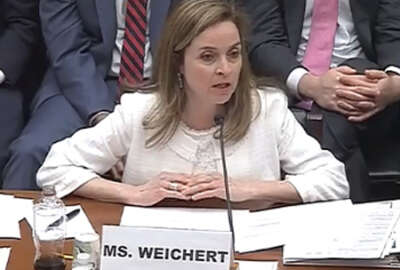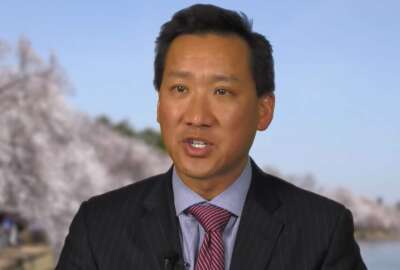
OMB’s Weichert: Government ‘paralyzed by the embarrassment of data’ it cannot use
Just days after President Donald Trump named her the acting director of the Office of Personnel Management, Margaret Weichert, also the Office of Management and...
Best listening experience is on Chrome, Firefox or Safari. Subscribe to Federal Drive’s daily audio interviews on Apple Podcasts or PodcastOne.
Just days after President Donald Trump named her the acting director of the Office of Personnel Management, Margaret Weichert, also the Office of Management and Budget’s deputy director for management, outlined some of her top priorities in the new role.
“There’s a lot that I need to get from a baseline perspective, but what I did tell the team yesterday is I have two primary areas of focus,” the President’s Management Agenda — particularly building the workforce of the future — and general management, Weichert said Wednesday at a Data Foundation event in Washington.
In a surprise move last Friday, the White House announced Weichert would replace Jeff Pon, who had been leading OPM since March. Weichert will also keep her current post as OMB DDM, where she has been a driving force behind the President’s Management Agenda.
While agencies look to implement the IT modernization and data accountability “gears” of the PMA, Weichert said the administration has gotten stuck on the third gear — the workforce.
“We’d make progress on IT modernization, maybe we’d make some progress on data, but you’d get stuck on this people stuff,” Weichert said. “Every time I asked, ‘Why can’t we do X, Y or Z differently?’ I was given some version of, ‘We don’t have the right people to lead the change. We don’t have the right skills to deal with that challenge. We can’t get people in fast enough with the most modern perspectives on things.”
Weichert arrived at OPM for her first day on the job Tuesday.
“It’s an important agency. It’s not unduly large, but it’s a 6,000-person organization facing a lot of change,” she said.
In June, the Trump administration proposed merging OPM with the General Services Administration. The agency personnel policy functions would get folded into the Executive Office of the President.
“Managing through change with data is how I operate, so I anticipate that I will be asking for tons of data, learning a lot, and I forward to working with my teammates at OPM. I’ve been very graciously welcomed, and really appreciate the professionalism of the team,” Weichert said.
Weichert also highlighted opportunities to commercialize government data.
“This set of assets that we have in the form of data can be used in ways that promote economic growth, and we can do this responsibly without compromising privacy, without compromising security,” Weichert
To that end, OMB and the Executive Office the President just completed a request for information (RFI) to stand up its Government Effectiveness Advanced Research (GEAR) Center, a public-private applied research center aimed at workforce reskilling and data commercialization.
“We want to stand up a center outside of government that includes a place for government – both federal, state, local and tribal – academia and the private sector to come together to look at critical issues, and data commercialization is one of those issues that we’ve queued up as one of two topics that we’re hoping the GEAR Center will focus on first.”
Weichert said OMB is now compiling the RFI responses, but did not specify exactly what kinds of government data she thought could be commercialized.
The PMA, Weichert said, serves as a rallying cry around IT modernization and data accountability, “so that it is no longer a joke to say you get good service from the American government.”
“Nobody tends to think that if I go interact with Social Security, it’s going to be a pleasant experience. And yet, you interact with the U.S. government every time you’re pulling down NOAA data through an app,” she added.
Since taking office at OMB, Weichert noted that government faces challenges in getting its arms around all of the data it collects.
Government challenged by wealth of data it collects
“I’ve faced challenges like this before, where it’s a matter of digging and asking different questions, and maybe pulling people together to compile often unstructured data from a variety of sources to form a picture, but what I discovered in a place that lives on, fundamentally, data about any number of things, that we didn’t even know what we had in government,” Weichert said.
Even in OMB, she said the agency lacks a comprehensive inventory of data from the reports it issues.
“We have, even in the Office of Management and Budget, any number of reports that are statutorily required, but where is that data stored? What data is included in them? There’s no metadata about anything, so we almost are paralyzed by the embarrassment of data that we can’t use,” Weichert said.
Achieving greater transparency in government data, she added, would help agencies manage fraud, waste and abuse.
“Every dollar we spend on inefficiency [and] bureaucracy – effectively waste – is dollars that can’t be spent fighting forest fires in Montana, or fighting to ensure that we have a forward stance with FEMA in response to an onslaught from a hurricane … It gets my blood boiling to think we have all this data. We should be able to do more with it,” she said.
Data transparency would also provide greater insight for lawmakers and private-sector partners that can increase the visibility of government data.
For example, Weichert praised USAFacts.org, a government data visualization venture launched by former Microsoft CEO Steve Ballmer, saying the website made it “a heck of a lot easier” for Americans to understand government spending statistics.
Copyright © 2024 Federal News Network. All rights reserved. This website is not intended for users located within the European Economic Area.
Jory Heckman is a reporter at Federal News Network covering U.S. Postal Service, IRS, big data and technology issues.
Follow @jheckmanWFED




